What drives individuals in sporting teams to come together? What is it that allows your athletes to be so inspired and fearless, they can operate at their full potential? The answers lies in the existence of a positive team culture. But what is that exactly and how do you impact it as coach? Let’s find out.

Building Team Culture In Sport: Team culture is often driven by the coach and leadership group but built upon by the athletes. All share a common belief in expected behavior and consequences, team values and goals, creating an environment of respect and unity, no matter what the outcome.
Successful teams with a recognizably positive team culture, The NBA’s San Antonio Spurs immediately come to mind here, makes me wonder what really goes on behind closed doors. How do the coaching staff mesh their different pieces together to create success?
This post aims to provide coaching staff, regardless of the sport and age of the athlete with the tools to create and build a team culture you’ll be proud of. Will you win more games? The honest answer is, I have no idea. But I do know, you’re giving your team the best chance at achieving your goals and progressing both as a team and individually as players.
“As a coach this culture is your vision or philosophy put into action.” (source)
Importance of Team Culture Within Sports Teams
Think back to your school days and involvement in team sports. What was the team culture like?
Did your team have a few “superstars,” which you might have been one yourself, who approached each game with the utmost confidence, leading your team consistently to victory on game day?
If this was the case, what was the culture like? What was the feeling around the locker room? Were the less talented players involved in the game and allowed the speak up? What happened if these less talented made a play and it wasn’t successful? Were they embraced, bullied or ignored altogether and made to feel lesser sportspeople?
Though this team may have won games and even championships, the momentum will be short-lived.
No successful team, including the Men’s USA Olympic Basketball Team, who are viewed as the pinnacle in the sport, can continue winning without focusing on building team culture.
I recently listened to this YouTube video with coach Mike Krzyzewski who talks about the importance of leaders setting the tone for the culture of the entire team. He mentioned players like LeBron James, Kobe Bryant and Jason Kidd who played in the 2004 Olympic team needing to lead the rest of the team by demonstrating the importance of working hard and respecting each other etc.
Putting a bunch of superstars and their egos together on the same team could cause a major dogfight regarding who’s the alpha, however, a focus on team culture from the coach has helped make them an unbelievably successful group across this coaches tenure.
Without a positive team culture, some players will lack a sense of purpose and feel like they don’t belong. They will have a limited desire to want to improve their own game because they are never going to make it and some players may even become withdrawn, too afraid to speak and act out of character in case they embarrass themselves or the team.
As coaches, building a positive team culture and having a “certain way things are done around here” type of attitude not only binds with success on the scoreboard but it also develops your athletes into good people who can make an impact on the lives of others away from the sporting arena.
Success tip:
Team culture is not transferable from one team or club to the next. While your values, benefits and expectations from your athletes can remain consistent, personalities, talent and goals will vary, forcing you to listen, adapt and start again.
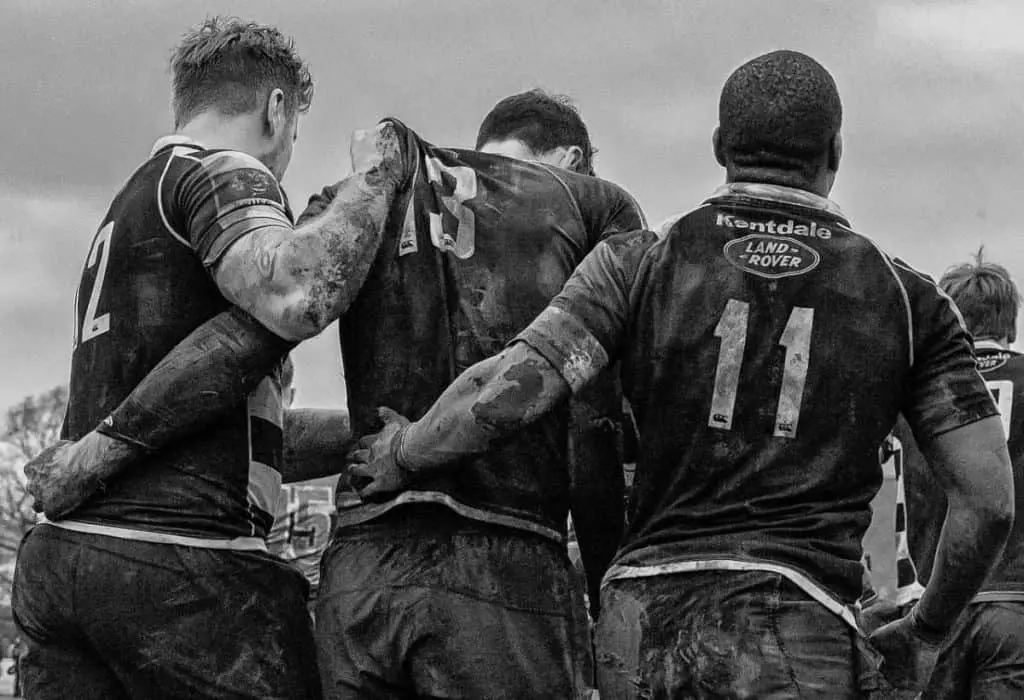
Building A Championship Culture
When discussing youth sports, as this website focuses on, sports at this level is not all about winning. It’s about helping children have fun, make friends, develop fine and large motor skills and simply have them enjoying playing the game.
The team culture we try and educate coaches on involves the positive involvement of parents (see post), equal playing time, limiting injury through a focus of not overtraining (see post) and also understanding the granular cultural detail will differ across genders (see post).
As these kids develop though, things can get even more complicated. Personalities develop and the shift can change to winning if your athletes are looking to progress into making the sport their profession. And culture becomes more important than ever.
Here are multiple ways you as the coach can build a positive team culture.
Be Precise in Defining Your Team’s Goals, Values and Attitudes
At the commencement of the season, we have talked about setting team goals, values and expected attitudes. At the youth level, we discuss the importance of doing so in the company of parents to enable transparency and focus from the whole team community. See this post here.
The coach and leadership staff need to continue to re-establish the desire to reach these goals right throughout the season. They can’t be forgotten about because of a few losses or injury to the most talented player.
Don’t be afraid to write down these goals and stick them in the locker room reminding everyone what they are striving for. The values and expected attitudes from your players should also remain consistent regardless of talent.
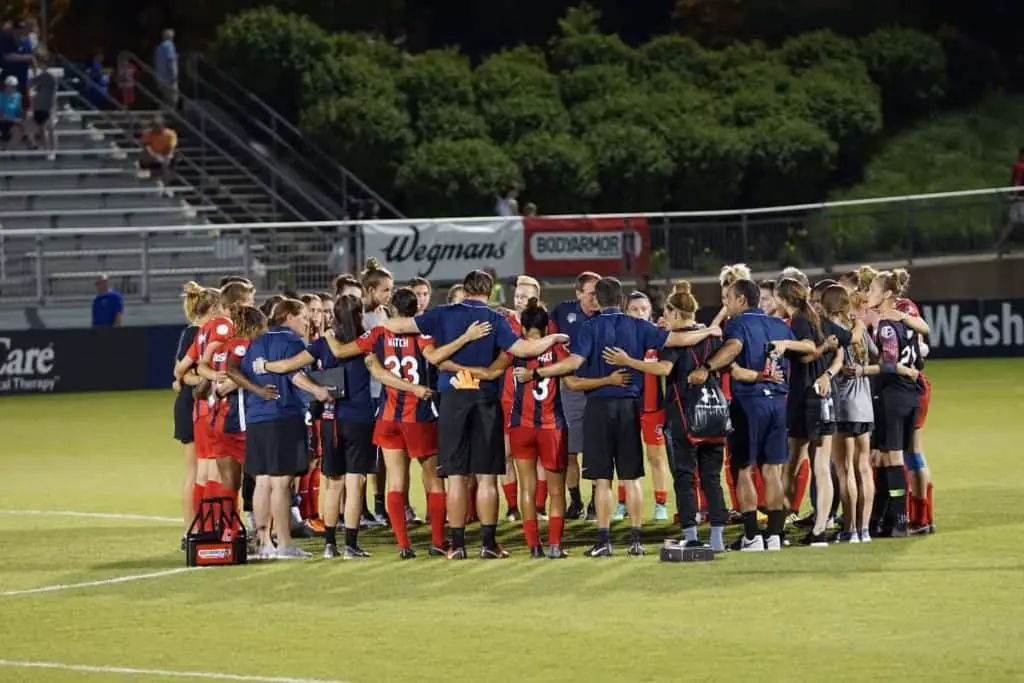
Appoint Captains
Though opinions vary on the need to appoint captains, see our post here titled – Should Coaches Pick Captains? Are They Worth The Trouble?, I am of the view they can be incredibly powerful in changing the culture of a team when those captains have a great relationship with the coaching staff.
In this TED Talk I watched recently, the speaker said, we as coaches need to create leaders. People who can influence change in a team environment and set the tone for a new culture and feeling around the club. I couldn’t agree more.
The process of appointing captains and knowing how to give them direction can be tricky, so please check out our post here for more help.
Embrace Failure
Even your best players can be paralyzed by the fear of failure.
Fear of messing up and letting you as the coach, their teammates and community down can cripple some athletes.
Your job is to create a team culture where failing is encouraged to prevent this from happening.
Build a culture where not only you, but the entire team respect players for trying something new and making that play.
As long as their behavior coincides with the values, beliefs and goals of the team, encourage players to speak up and try – even if they fail.
As Wayne Gretzky once said, “You miss 100 percent of the shots you never take”
Another thought here regarding embracing failure involves you as coach. Don’t be afraid to try something new, break the rules and do things differently within your team values. While you don’t know if it will work, you never know if you don’t try!
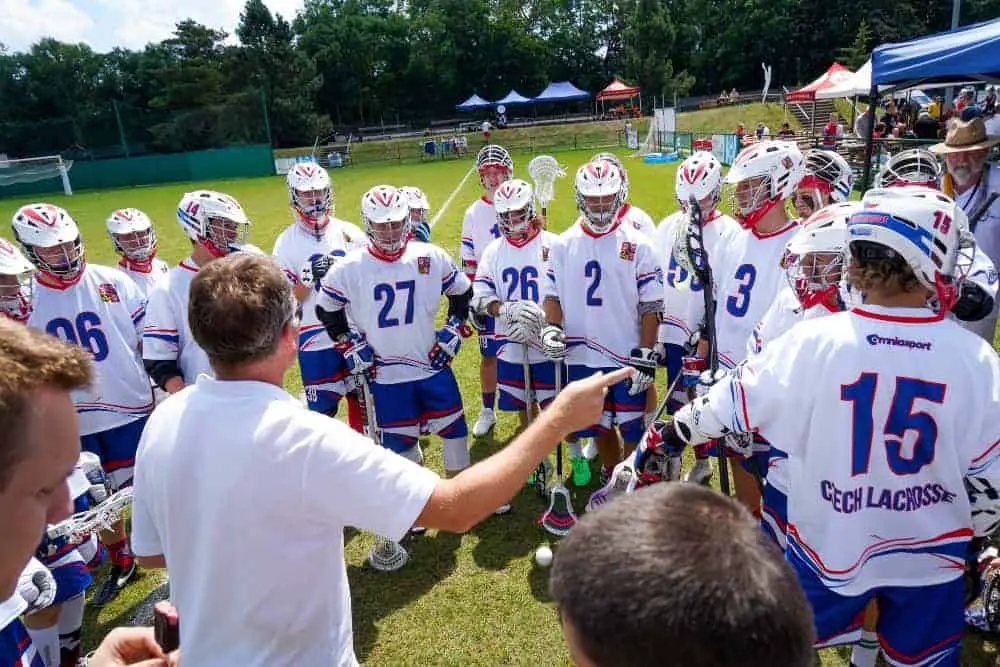
Delegate Roles
Another component to building a successful team culture is to get everyone involved, and I’m not simply talking about the coaching staff.
The captain/s, team mom’s, other parents and the local community can all play a role in developing the culture. When people are felt valued and respected they are more likely to show an interest and contribute, in their particular capacity, for the benefit of the entire program.
People want to be involved in situations where they feel like they have a role to play and are appreciated for doing their bit.
As the coach, delegating roles to captains, team mom’s, team parents, the groundskeeper/stadium supervisor, school community and members of the public will fall on your shoulders. Don’t be intimidated by these people and instead consider ways they can help the team.
“Having everyone understand their unique role is vital to overall success”.
source
Celebrate Your Culture
Are you noticing your players starting to act and behave in a way that honors your team culture? Celebrate it.
Changing a culture can be extremely difficult and coaches need to “celebrate the small wins.”
One way to celebrate your culture is to praise. I recently read that a good way of doing this is to create merchandise with your team motto printed on it to visually show the entire community what the team culture is all about.
Financially, this option may not be viable but it’s a thought for those with the resources.

Involve The Athlete
Team culture may be driven by the coach but it’s developed by the athletes.
Coaches cannot expect to change or alter the culture of a sports team without the drive from athletes.
Coaches need to provide opportunities where players can build team culture. This could be through the following:
- “Open Mic Monday” where players are given the opportunity to “get things off their chest” in a respectful way to help the team succeed.
- Allow them to suggest and organize team bonding exercises such as an escape room or team yoga events.
- Be open to changing warm-up and the structure of cooling down.
- In youth teams, allow players to use nicknames and music during practices. See – What are the Responsibilities of a Youth Sports Coach?
- Having a player or coach take the team through a short prayer session when you’re on the road.
- Be open to feedback, when presented in the right way and time.
Accepting feedback is a big part of developing a strong team culture because, I hate it say it, sometimes we are wrong.
Being able to take constructive feedback from coaches, players and the community without getting defensive allows you to grow as a coach and strengthens the culture. Though you might disregard some of the feedback, there is power in listening and allowing others to speak.
Create Team Rituals
The funny thing about rituals is they often develop organically. A player will do something or say something that is liked and appreciated by others that soon becomes “a thing” the team simply does from then on.
However, coaches can play a part in developing rituals such as requiring all players wearing the team-branded clothing to and from games and having all players complete a specific drill at practice before you can go home to actively measure progress.
Creating recognizable moments encourages the development of team culture and belonging.
“When a team has a defined culture that is understood and accepted by all of its members, they feel an implicit pressure (in the good sense) to support that culture”.
Psychology Today
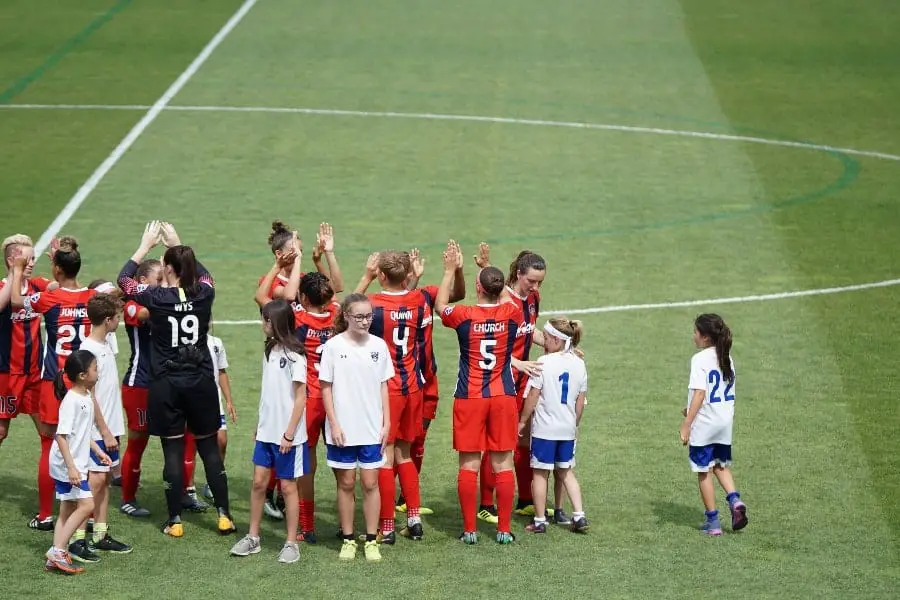
Grow With Your Coaching Staff
As I mentioned, building a championship team culture requires more than simply you as head coach. It takes an army.
Use your coaching staff to help build the culture you are envisioning. Though their role can take many forms, here are some ideas you can use to tighten the bonds within your coaching team.
- Attend coaching clinic together
- Give them the opportunity to take warm-up and cool down
- Allow them to contribute verbally during the game. Maybe when there is a break in play?
- Teach them how to cut film and give them the confidence to report their findings to the team during practice.
- Have regular dinners with the coaching staff
- During games ask them to keep track of particular stats and then use this information either during that game or during practice. Assistant coaches need to know their work is actually being used and not simply a job you’ve given them with no purpose.
Hold Everyone Accountable
Players and coaches need to be answerable in regards to their role within the team. If people show up late, bully one another, display a bad attitude and/or purposely disobey the team rules and values, there needs to be immediate consequences. Regardless of the level of talent or position.
In our post titled, Coaches Guide to Managing Disrespectful Youth Athletes you’ll find a helpful guide discussing what these consequences could be.
However, don’t let this distract you from coaching, becoming your only focus. Helping your athletes find their purpose and building confidence is imperative.
Once your athletes feel at ease to make mistakes and have a voice, you’ll probably find their respect for team culture will naturally grow.
“The culture establishes norms of acceptable behavior on a team, either explicitly or implicitly conveying to members what is allowed and what is not”
Psychology Today
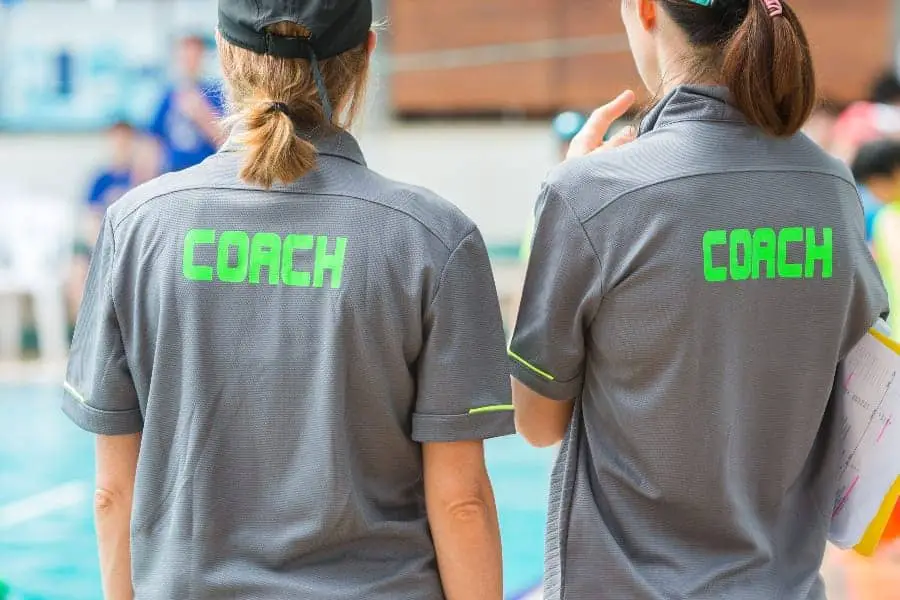
Methods to Creating Team Culture
When trying to create team culture there are two trains of thought.
- Let the team create their own culture, guiding it in the “right direction” where necessary. The fear here is the bigger, dominating personalities within the team dictate the type of feeling one gets around the group and the introverted or the quiet achievers miss out on having a say.
- Alternatively, coaches can be very deliberate in establishing the culture they want. Though it may seem dominating in nature, these coaches are proactive in establishing captains and supporting coaching staff to install a particular culture from the beginning rather than single handily taking over.
I recently read that successful sports coaches,
“Have been deliberate about creating the culture they want. They have never let it just happen or emerge.”
source
Take a second and consider the type of sports coach you need to be in order to alter your current team or future team’s culture.
What is your personal coaching vision or philosophy? What’s motivates you? Winning, individual improvements or team success? Is your atmosphere at practice and on game day relaxed or intense? Supportive or competitive?

Changing The Culture
Before you can even consider making changes to your team culture as coach, you need to take a step back. View your team from a different vantage point and see what other people see.
Do they see team unity on the bench where players encourage a teammate to still make the next play, even if the last one didn’t go as they would have liked?
Do they see your team, including coaching staff, as positive members of the community, paving the way for others to strive for the better?
Do they see a coach (you) who is engaged, giving every player in the team a chance to succeed?
Ask your spouse/partner, friends and members of the community for an honest opinion. They say love is blind, but often coaches can have the blinkers on too!
[VIDEO] – Need some inspiration? Watch the following video. It’s about the New Zealand All Blacks. How they have sustained a winning history through the development of a strong team culture.
Summary: The Complete Coaches Guide to Building Team Culture In Sport
When you’re involved in a team that generally respects one another it’s a true privilege. Amazing things start to happen when athletes find their purpose and are not afraid to make mistakes.
Though building positive team culture in any sports team is not an overnight job, it’s well worth the time and commitment to make it happen.
How do you create a positive team culture?
Cheers,
Emma

